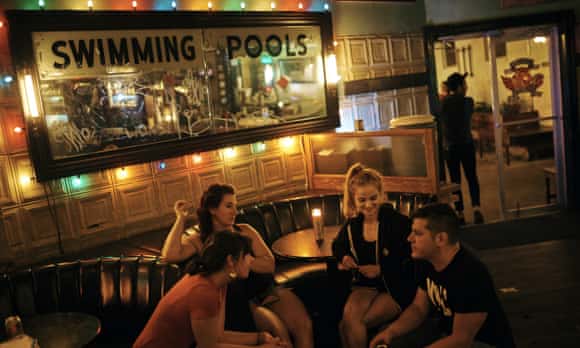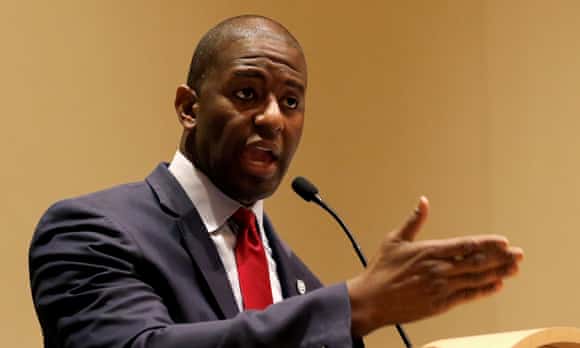 |
Progressives are making political gains – with one $27 donation at a time
|
Andrew Gillum, who was endorsed by Bernie Sanders, won Florida’s Democratic primary this week as Julia Salazar in Brooklyn challenges an incumbent for state senate
|
 |
 Julia Salazar supporters at the Union Pool bar in Brooklyn, New York on 19 August 2018. Photograph: Andres Kudacki/AP
|
Adam Gabbatt
|
The Resistance Now is a weekly update on the people, action and ideas driving the protest movement in the US. If you’re not already receiving it by email, subscribe.
|
A progressive governor for Florida?
Andrew Gillum, the mayor of Tallahassee, won the Democratic primary for governor in Florida on Tuesday, setting up a potentially revealing battle against a Trump-backed Republican.
Gillum, a progressive who was endorsed by Bernie Sanders, made the case on the stump that he was the only candidate in the race who was not a billionaire or millionaire.
|
 |
 Andrew Gillum. Photograph: Joe Skipper/Reuters
|
The 39-year-old won with 34% of the vote in the primary, beating out Gwen Graham and Philip Levine, both of whom had been seen as favorites earlier in the primary race.
Gillum’s agenda includes supporting calls for a $15-an-hour minimum wage, Medicare for all and opposing Florida’s controversial “stand your ground” self-defense law, which gained international notoriety in 2012 with the killing of an unarmed black teenager, Trayvon Martin, the Guardian’s Erin Durkin wrote.
Julia Salazar interview
In the 48 hours following Alexandria Ocasio-Cortez’s shock victory in a New York Democratic primary earlier in the summer, another candidate, Julia Salazar in Brooklyn, took in $20,000 in donations, “many of them for $27”, she says, which was the average amount, it turned out, that people donated to Bernie Sanders’s presidential campaign.
Salazar, who is challenging Martin Dilan, a 16-year Democratic incumbent, for a seat in the New York state senate, is a Democratic socialist whose campaign has attracted nationwide interest.
|
 |
 Julia Salazar in her campaign headquarters in Bushwick, New York City. Photograph: Max Burkhalter for the Guardian
|
|
“I am really eager to talk about it if it comes up. But even when it does, I’ve heard from other canvassers who have mentioned it – ‘She’s the democratic socialist running’ – people don’t even blink. It doesn’t faze them.”
Prison strikers facing backlash from officials
Inmates taking part in the nationwide prison strike are now facing reprisals from prison officials as they attempt to draw attention to what strikers describe as “modern slavery” in their often-compulsory work duties for pennies.
The prison strike began on 21 August, in a bid to highlight virtually unpaid prison labor and poor conditions in prisons.
The Guardian’s Jamiles Lartey writes:
The retaliation and repression was instantaneous and constant,” said Brooke Terpstra, spokesperson for the Incarcerated Workers Organizing Committee, one of the groups helping publicize the strike. “Leaders were picked off, one by one, and thrown into solitary in anticipation of the strike that was coming.”
Family members said that was what happened to Ronald Brooks, a Louisiana inmate who has spent the past 20 years at the infamous Angola prison. After appearing in a video supporting the strike, they said, he was transferred hundreds of miles, suddenly. Like some other organizers, Brooks has used a contraband cellphone to relay his grievances to the world.
What we’re reading
Kevin Rashid Johnson is an inmate at Sussex state prison in Waverly, Virginia, who has been taking part in the nationwide prison strike. Johnson, who is serving a life sentence for murder – he says he was misidentified and is innocent – wrote for the Guardianlast week about the importance of the strike action.
I see prison labor as slave labor that still exists in the United States in 2018. In fact, slavery never ended in this country.
Anybody convicted of a crime after 1865 could be leased out by the state to private corporations who would extract their labor for little or no pay.
In some ways that created worse conditions than under the days of slavery, as private corporations were under no obligation to care for their forced laborers – they provided no healthcare, nutritious food or clothing to the individuals they were exploiting.
|
|
|